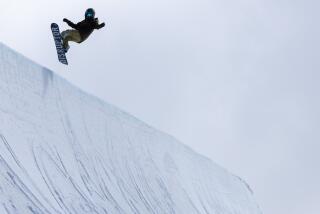Tips for Staying on the Slopes and Out of the ER
- Share via
Skiers and snowboarders who want to stay injury-free should keep up their exercise routine year-round and then incorporate sport-specific conditioning several weeks before the first outing. But even if you’ve fallen short of that ideal this year, there are measures you can take to reduce the risk of injuries once you’re on the slopes.
Heed the advice of Dr. Dan O’Neill, an orthopedic surgeon in Northampton, Mass., who has researched ski and snowboard injuries and published his findings in the American Journal of Sports Medicine: Wear proper safety gear. That means wrist guards for snowboarders and helmets for snowboarders and skiers.
He bases this recommendation partly on clinical experience and also on his study of nearly 16,000 first-time downhill skiers and 7,000 first-time snowboarders. He found that 4% of each group were injured to the extent of needing emergency medical attention.
The types of injuries were different, with boarders more likely to have concussions and wrist fractures and skiers more likely to injure their knees. The primary injury site, he says, is linked to each sport’s typical fall: Boarders often fall backward on their heads or forward on their arms while skiers often twist their knees.
In Southern California, snowboarding is a popular youth sport, and a hospital serving San Bernardino Mountains resorts has seen a rise in boarding injuries compared with downhill skiing injuries.
“We have seen a dramatic increase in the number and severity of snowboarding injuries,” says Stephanie Wright, a nurse and trauma coordinator for Arrowhead Regional Medical Center in Colton. She cites spinal cord and abdominal injuries as two examples.
Nationwide, alpine skiing remains the more lethal sport. Jake Shealy, an engineering professor at Rochester (N.Y.) Institute of Technology, studied the 1998-99 season and found 0.7 death per 1 million ski visits and 0.46 per million for snowboarders. (He tallied only trauma-related deaths, not medical-related deaths, such as heart attacks, on the slopes.)
For safer snowboarding, O’Neill recommends wearing wrist guards sold for in-line skating. Studies differ on whether wrist guards reduce risk of injury, O’Neill acknowledges, but in his ongoing study of 100 boarders wearing them, no one has broken a wrist. And, he points out, wrist guards are easy to wear.
He sees less resistance to helmets, too, given that elite skiers wear them.
Skiers should make sure their equipment, whether rented or their own, is in good condition. For instance, he says, perform a release test of ski bindings each day, trying to step out of the skis by turning sideways and without using the poles.
Common-sense measures can also reduce the likelihood of ending up at the nearest emergency room. “Don’t get exhausted,” O’Neill says, noting that injuries increase with fatigue. He jokes that his general rule is, “If you are over 30, don’t ski past 3 p.m.”
“Fatigue is a big factor in injuries,” agrees Dr. Nicholas DiNubile, orthopedic consultant to the Philadelphia 76ers basketball team and clinical assistant professor of orthopedic surgery at the Hospital of the University of Pennsylvania in Philadelphia. The first day or two, take frequent breaks, he suggests, as often as every two hours. “Don’t be first on and last off the hill, especially if you are at higher altitude than you are used to,” he says.
“If you are coming off an injury, especially knee reconstruction, the first time out take a lesson. I have seen people with ACL [anterior cruciate ligament] repair, and they can’t execute a simple turn. Spend the morning with an instructor.”
DiNubile also suggests eating a good breakfast to fuel the muscles and ward off fatigue. Stretch before you hit the slopes. Start slowly, on easier runs, especially your first time out for the season. “Let your muscle memory kick in,” he says.
Snowboarding is probably easier to learn than downhill skiing, DiNubile says, but as you get older, it gets tougher, due to generally reduced flexibility and other factors.
And whatever your skill level, skip the alcoholic drinks at lunch. “Alcohol throws off your reflexes,” DiNubile says. And maybe your judgment.


